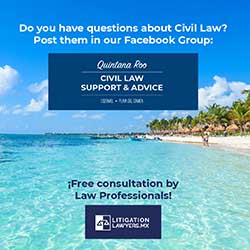Cozumel Condo Litigation
Three Important Tips for Condo Assemblies
text & translation: Myriam Lopez, Litigation Lawyers
It is condo assembly season for most ex-pats with a condo in Mexico! In this article, we will give you three critical legal tips to set condo fees and impose fines properly; and to avoid losing your rights for the mere passage of time.

Tip 1: Record condo dues
Write down the condo dues and the percentage to be borne by each condo owner in the annual assembly minutes. Note the payment system, the payments due dates, and state very clearly the penalties for late compliance and continuous delinquency (penalties could accumulate for months or years). Even if every condo owner knows when and how to pay, if you fail to put it down in the minutes, a delinquent condo owner could argue in court that she did not know how much, when or how to pay.
Tip 2: Avoid the statues of limitations
Avoid the Statues of Limitations or the loss of the right to recover condo fees for the mere passage of time. There are precedents of jurisprudence that establish that condominiums have two years to claim outstanding ordinary condo fees safely; after two years, it gets complicated. If you have delinquent condo owners, do not let the situation progress beyond a year of outstanding payments. You may file a lawsuit after two failed payments of maintenance fees. The administration and the Vigilance Committee will need to produce documentation. We will be happy to help you to prepare it properly.
Tip 3: Impose fines properly
To impose a fine against a condo owner in an assembly, the condo administrator or the Vigilance Committee must inform the general assembly of the situation that has led them to propose to apply a fine already set in the condo regulations. Please note that fines should be discussed in the assembly and recorded in the minutes to be valid.
At the assembly, the infraction’s profs should be presented, and the infringing condo owner should be allowed to speak and present any argument or proof on her behalf. This is truly important when the fine is not because of late payments but something more severe.
If a fine is levied, it should be based on an article of the condo regulations or the applicable law, and the assembly should explain why it was imposed. The fine must be approved by at least 50% of the condo owners.
 We understand that condo owners prefer to keep the assemblies peaceful, but the condo law requires all of the above elements; otherwise, the fines will not stand in court.
We understand that condo owners prefer to keep the assemblies peaceful, but the condo law requires all of the above elements; otherwise, the fines will not stand in court.
Do you have any legal questions about condos, property or business in Mexico? If you do, post your question in our Facebook group Quintana Roo. Civil Law – Support and Advice (Cozumel, Playa del Carmen)
We will answer it! – Myriam Lopez
3 CONSEJOS PARA ASAMBLEAS DE CONDOMINIOS
Por Myriam Lopez, Litigation Lawyers
¡Es temporada de asambleas de condóminos para la mayoría de los extranjeros que tienen un condominio en México! En este artículo, les daremos tres consejos legales críticos para establecer cuotas e imponer multas correctamente; y para evitar perder sus derechos por el paso del tiempo.
Consejo 1: Anoten las cuotas
Anoten las cuotas de condominio y el porcentaje que deberá pagar cada propietario de en las actas de la asamblea anual. Anoten también el método, las fechas de pagos y establezcan muy claramente las sanciones por incumplimiento y morosidad (las sanciones pueden acumularse durante meses o años). Aún cuando todos los propietarios sepan cómo pagar, si ello no se establece en las minutas de la asamblea, el propietario moroso podría argumentar en la corte que no sabía cuánto, cuándo o cómo pagar.
método, las fechas de pagos y establezcan muy claramente las sanciones por incumplimiento y morosidad (las sanciones pueden acumularse durante meses o años). Aún cuando todos los propietarios sepan cómo pagar, si ello no se establece en las minutas de la asamblea, el propietario moroso podría argumentar en la corte que no sabía cuánto, cuándo o cómo pagar.
Consejo 2: Eviten la prescripcion
Eviten la pérdida del derecho a recuperar las cuotas condominales por el paso del tiempo. Existe jurisprudencia que establecen que los condóminos tienen dos años para reclamar de forma segura las cuotas pendientes de pago; después de dos años, se complica. Si tiene vecinos morosos, no permitan que la situación progrese más allá de un año de pagos pendiente. Pueden presentar una demanda después de dos pagos atrasados de cuotas de mantenimiento. La administración y el Comité de Vigilancia deberán producir documentación. Estaremos encantados de ayudarte a prepararla correctamente.
Consejo 3: Impongan multas adecuadamente
Para imponer una multa a un condominio en una asamblea, el administrador del condominio o el Comité de Vigilancia deben informar a la asamblea general de la situación que los ha llevado a imponer una multa ya establecida en el reglamento del condominio. Tenga en cuenta que las multas deben discutirse en la asamblea y registrarse en el acta para que sean válidas.
En la asamblea, se le debe dar el derecho a los infractores de defenderse y de presentar cualquier argumento o prueba en su favor. Esto es realmente importante cuando la multa no se debe a retrasos en los pagos, sino a algo más severo.
Si se impone una multa, debe basarse en un artículo del reglamento del condominio o la ley aplicable, y la asamblea debe explicar por qué se impuso. La multa debe ser aprobada por al menos el 50% de los propietarios del condominio.
Entendemos que los condóminos prefieren mantener las asambleas pacíficas, pero la ley de condominios requiere todos los elementos anteriores; de lo contrario, las multas podrían ser revocadas en los tribunales.
 ¿Tiene alguna pregunta legal sobre condominios, propiedades o negocios en México? Si es así, publique su pregunta en nuestro grupo de Facebook Quintana Roo. Derecho Civil – Apoyo y Asesoramiento (Cozumel, Playa del Carmen) link
¿Tiene alguna pregunta legal sobre condominios, propiedades o negocios en México? Si es así, publique su pregunta en nuestro grupo de Facebook Quintana Roo. Derecho Civil – Apoyo y Asesoramiento (Cozumel, Playa del Carmen) link
¡Nosotros les responderemos! – Myriam Lopez
______________________________
Una ex yanqui de Connecticut quien llama hogar a Cozumel desde hace más de 15 años. Laura escapó al Caribe hace años, desplazándose de una isla a otra dando clases de BUCEO. Se dedicó a perder el tiempo en Jamaica y finalmente se detuvo en Cozumel para pasar unas vacaciones de 2 semanas que aún no terminan. Convenciendo a sus padres que pagaran una elegante universidad privada, obtuvo su título en Periodismo y Laura crea semanalmente Cozumel 4You, medios sociales y artículos promocionales sobre la Isla y también es moderadora en el grupo Cozumel 4 You en Facebook que actualmente cuenta con 25,000 miembros. Fabián, s umuy tolerante marido, desde hace mucho tiempo se resignó a no tener vida privada, pues se ha visto implicado en los diversos proyectos y planes que urde Laura. Son orgullosos padres de diversos perros y gatos rescatados. Mientras contempla su paso a través de la vida en el Caribe mexicano,Laura continúa siendo la pesadilla en la existencia de su muy tradicional suegra mexicana.
- Mexico New Coins - April 18, 2025
- Feria Cedral 2025 - April 18, 2025
- 2025 Turtle Season - April 18, 2025
An ex-Connecticut Yankee who has called Cozumel home for over 18 years, Laura ran away to the Caribbean years ago, bumped around the islands teaching SCUBA diving, lost some time in Jamaica, and finally stopped in Cozumel for a 2 week vacation that hasn’t ended yet. With a degree in Journalism from a fancy private college she convinced her parents to pay for, Laura writes, edits, and creates the weekly Cozumel 4 You news, social media, and promotional articles about the island, as well as moderates the Cozumel 4 You Facebook group, which currently has over 25,000 members. Her long suffering husband, Fabian, has long since resigned himself to having zero private life, as he’s been involved in her various schemes and plots since his arrival. Proud parents to a variety of rescue dogs and cats, Laura continues to be the bane of her traditional Mexican mother-in-law’s existence, as she muses her way through life in the Mexican Caribbean. ______________________________ Una ex yanqui de Connecticut quien llama hogar a Cozumel desde hace más de 15 años. Laura escapó al Caribe hace años, desplazándose de una isla a otra dando clases de BUCEO. Se dedicó a perder el tiempo en Jamaica y finalmente se detuvo en Cozumel para pasar unas vacaciones de 2 semanas que aún no terminan. Convenciendo a sus padres que pagaran una elegante universidad privada, obtuvo su título en Periodismo y Laura crea semanalmente Cozumel 4You, medios sociales y artículos promocionales sobre la Isla y también es moderadora en el grupo Cozumel 4 You en Facebook que actualmente cuenta con 25,000 miembros. Fabián, s umuy tolerante marido, desde hace mucho tiempo se resignó a no tener vida privada, pues se ha visto implicado en los diversos proyectos y planes que urde Laura. Son orgullosos padres de diversos perros y gatos rescatados. Mientras contempla su paso a través de la vida en el Caribe mexicano, Laura continúa siendo la pesadilla en la existencia de su muy tradicional suegra mexicana.
Mexico New Coins
Mexico New Coins Mexico’s National Bank to Release New Coins Mexico’s...
Cozumel Property Tax & Garbage Taxes
Cozumel Property Tax & Garbage Taxes Property Tax & Garbage Collection Fines...
Cozumel Water Pressure CAPA
Cozumel Water Pressure CAPA Cozumel. Problems in water supply due to...
Foundation Parks Museums membership card Residents
Foundation Parks Museums membership card Residents Foundation Parks and Museums membership...



















Leave a comment